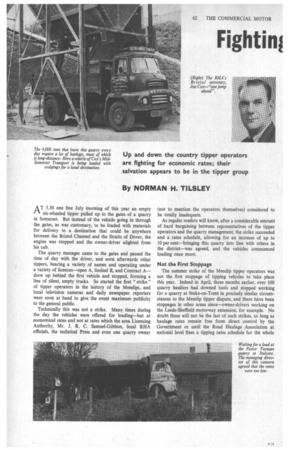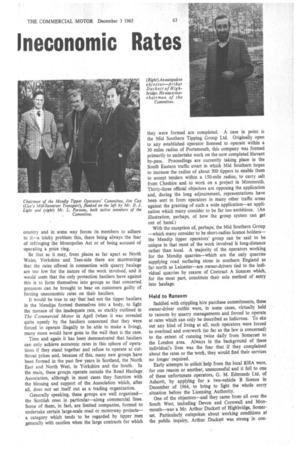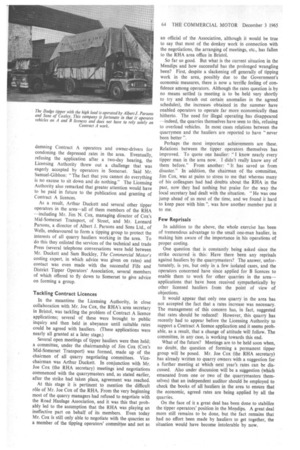Fighting Ineconomic Rates
Page 64

Page 65

Page 66

If you've noticed an error in this article please click here to report it so we can fix it.
By NORMAN H. TILSLEY
AT 5.30 one fine July morning of this year an empty six-wheeled tipper pulled up to the gates of a quarry in Somerset. But instead of the vehicle going in through the gates, as was customary, to be loaded with materials for delivery to a destination that could be anywhere between the Bristol Channel and the Straits of Dover, the engine was stopped and the owner-driver alighted from his cab.
The quarry manager came to the gates and passed the time of day with the driver, and soon afterwards other tippers, bearing a variety of names and operating under a variety of licences—open A, limited B, and Contract A— drew up behind the first vehicle and stopped, forming a line of silent, empty trucks. So started the first " strike " of tipper operators in the history of the Mendips, and local television cameras and daily newspaper reporters were soon at hand to give the event maximum publicity to the general public.
Technically this was not a strike. Many times during the day the vehicles were offered for loading—but at economical rates and not at rates which the area Licensing Authority, Mr. J. R. C. Samuel-Gibbon, local RHA officials, the technical Press and even one quarry owner (not to mention the operators themselves) considered to be totally inadequate.
As regular readers will know, after a considerable amount of hard bargaining between representatives of the tipper operators and the quarry management, the strike succeeded and a rates schedule, allowing for an increase of up to 10 per cent—bringing this quarry into line with others in the district—was agreed, and the vehicles commenced loading once more.
Not the First Stoppage The summer strike of the Mendip tipper operators was not the first stoppage of tipping vehicles to take place this year. Indeed in April, three months earlier, over 100 quarry hauliers had downed tools and stopped working for a quarry at Stoke-on-Trent in precisely similar circumstances to the Mendip tipper dispute, and there have been stoppages in other areas since—owner-drivers working on the Leeds-Sheffield motorway extension, for example. No doubt these will not be the last of such strikes, so long as haulage rates remain free from direct control by the Government or until the Road Haulage Association at national level fixes a tipping rates schedule for the whole country and in some way forces its members to adhere to it—a tricky problem this, there being always the fear of infringing the Monopolies Act or of being accused of Operating a price ring.
Be that as it may, from places as far apart as North Wales, Yorkshire and Tees-side there are murmurings that the rates offered in connection with quarry haulage are too low for the nature of the work involved, and it would seem that the only protection hauliers have against this is to form themselves into groups so that concerted pressures can be brought to bear on customers guilty of forcing uneconomic rates on their hauliers.
It would be true to say that had not the tipper hauliers in the Mendips formed themselves into a body, to fight the menace of the inadequate rate, so starkly outlined in The Commercial Motor in April (when it was revealed quite openly by the hauliers concerned that they were forced to operate illegally to be able to make a living), many more would have gone to the wall than is the case.
Time and again it has been demonstrated that hauliers can only achieve economic rates in this sphere of operations if they stand together and refuse to operate at cutthroat prices and, because of this, many new groups have been formed in the past few years in Scotland, the North East and North West, in Yorkshire and the South. In the main, these groups operate outside the Road Haulage Association, although in most cases they function with the blessing and support of the Association which, after all, does not set itself out as a trading organization.
Generally speaking, these groups are well organized— the Scottish ones in particular—along commercial lines. Some of them, in fact, are limited companies, formed to undertake certain large-scale road or motorway projects— a category which tends to be regarded by tipper men generally with caution when the large contracts for which they were formed are completed. A case in point is the Mid Southern Tipping Group Ltd. Originally open to any established operator licensed to operate within a 30 miles radius of Portsmouth, this company was formed primarily to undertake work on the now completed Havant by-pass. Proceedings are currently taking place in the South Eastern traffic court in which Mid Southern hopes to increase the radius of about 500 tippers to enable them to accept tenders within a 150-mile radius, to carry salt from Cheshire and to work on a project in Monmouth. Thirty-three official objectors are opposing the application and, during the long adjournment, representations have been sent in from operators in many other traffic areas against the granting of such a wide application—an application which many consider to be far too 'ambitious. (An illustration, perhaps, of how the group system can get out of hand.) With the exception of, perhaps, the Mid Southern Group —which many consider to be short-radius licence holders— the Mendip tipper operators' group can be said to be unique in that most of the work involved i long-distance rather than local. A majority of the operators working for the Mendip quarries—which are the only quarries supplying road surfacing stone in southern England as far north as Leicester—are owner-drivers tied to the individual quarries by reason of Contract A licences which, for the most part, constitute their sole method of entry into haulage.
Held to Ransom Saddled with crippling hire purchase commitments, these owner-driver outfits were, in some cases, virtually held to ransom by quarry managements and forced to operate at rates which can only be described as ludicrous. To eke out any kind of living at all, such operators were forced to overload and overwork (so far as the law is concerned) to the extent of running twice daily from Somerset to the London area. Always in the background of these individual's lives was the fear that if they complained about the rates or the work, they would find their services no longer required. Early attempts to solicit help from the local RHA were, for one reason or another, unsuccessful and it fell to one of these unfortunate operators, G. M. Edmunds Ltd. of Ashcott, by applying for a two-vehicle B licence in December of 1964, to bring to light the whole sorry situation before the Licensing Authority.
One of the objectors—and they came from all over the South West, including Devon and Cornwall and Monmouth—was a Mr. Arthur Duckett of Highbridge, Somerset. Particularly outspoken about working conditions at the public inquiry, Arthur Duckett was strong in con demning Contract A operators and owner-drivers for condoning the depressed rates in the area. Eventually, refusing the application after a two-day hearing, the Licensing Authority threw out a challenge that was eagerly accepted by operators in Somerset. Said Mr. Samuel-Gibbon: "The fact that you cannot do everything is no excuse to sit down and do nothing." The Licensing Authority also remarked that greater attention would have to be paid in future to the publication and granting of Contract A licences.
As a result, Arthur Duckett and several other tipper operators in the area—all of them members of the RHA —including Mr. Jim N. Cox, managing director of Cox's Mid-Somerset Transport, of Street, and Mr. Leonard Parsons, a director of Albert J. Parsons and Sons Ltd., of Wells, endeavoured to form a tipping group to protect the interests of all quarry hauliers working in the area. To do this they enlisted the services of the technical and trade Press (several telephone conversations were held between Mr. Duckett and Sam Buckley, The Commercial Motor's costing expert, in which advice was given on rates) and contact was even made with the successful Fife and District Tipper Operators' Association, several members of which offered to fly down to Somerset to give advice on forming a group.
Tackling Contract Licences In the meantime the Licensing Authority, in close collaboration with Mr. Joe Cox, the RHA's area secretary in Bristol, was tackling the problem of Contract A licence applications; several of these were brought to public inquiry and then held in abeyance until suitable rates could be agreed with hauliers. (These applications were nearly all granted at a later stage.) Several open meetings of 'tipper hauliers were then held; a committee, under the chairmanship of Jim Cox (Cox's Mid-Somerset Transport) was formed, made up of the chairmen of all quarry negotiating committees. Vicechairman was Arthur Duckett. In conjunction with Mr. Joe Cox (the RHA secretary) meetings and negotiations commenced with the quarrymasters and, as stated earlier, after the strike had taken place, agreement was reached.
At this stage it is pertinent to mention the difficult role of Mr. Joe Cox of the RHA. From the very beginning most of the quarry managers had refused to negotiate with the Road Haulage Association, and it was this that probably led to the assumption that the RHA was playing an ineffective part on behalf of its members. Even today Mr. Cox is still only able to negotiate with the quarries as a member of the tipping operators' committee and not as an official of the Association, although it would be true to say that most of the donkey work in connection with the negotiations, the arranging of meetings, etc., has fallen to the RHA area office in Bristol.
So far so good. But what is the current situation in the Mendips and how successful has the prolonged wrangling been? First, despite a slackening off generally of tipping work in the area, possibly due to the Government's economic measures, there is now a terrific feeling of confidence among operators. Although the rates question is by no means settled (a meeting is to be held very shortly to try and thrash out certain anomalies in the agreed schedules), the increases obtained in the summer have enabled operators to operate far more economically than hitherto. The need for illegal operating has disappeared —indeed, the quarries themselves have seen to this, refusing to overload vehicles. In most cases relations between the quarrymen and the hauliers are reported to have "never been better ".
Perhaps the most important achievements are these. Relations between the tipper operators themselves has improved. To quote one haulier: "I know nearly every tipper man in the area now. I didn't really know any of them before." From another: "It has saved us from disaster." In addition, the chairman of the committee, Jim Cox, was at pains to stress to me that whereas many of his colleagues had had doubts about the RHA in the past, now they had nothing but praise for the way the local secretary had dealt with the situation. "He was one jump ahead of us most of the time, and we found it hard to keep pace with him ", was how another member put it to me.
Few Reprisals In addition to the above, the whole exercise has been of tremendous advantage to the small one-man haulier, in making him aware of the importance in his operations of proper costing.
One question that is constantly being asked since the strike occurred is this: Have there been any reprisals against hauliers by the quarrymasters? The answer, unfortunately, is yes, but only in a few isolated cases, and the operators concerned have since applied for B licences to enable them to work for other quarries in the area— applications that have been received sympathetically by other licensed hauliers from the point of view of objections.
It would appear that only one quarry in the area has not accepted the fact that a rates increase was necessary. The management of this concern has, in fact, suggested that rates should be reduced! However, this quarry has recently had to appear before the Licensing Authority to support a Contract A licence application and it seems probable, as a result, that a change of attitude will follow. The committee, in any case, is working towards this end.
What of the future? Meetings are to be held soon when, no doubt, the question of forming a permanent tipper group will be posed. Mr. Joe Cox (the RHA secretary) has already written to quarry owners with a suggestion for a further meeting at which next year's rates can be discussed. Also under discussion will be a suggestion (which emanated from one or two of the quarrymasters themselves) that an independent auditor should be employed to check the books of all hauliers in the area to ensure that the economic, agreed rates are being applied by all the quarries.
On the face of it a great deal has been done to stabilize the tipper operators' position in the Mendips. A great deal more still remains to be done, but the fact remains that had no effort been made by hauliers to get together, the situation would have become intolerable by now.
















































































































































































